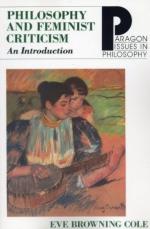|
This section contains 10,229 words (approx. 35 pages at 300 words per page) |

|
SOURCE: “‘This Is and Is Not Cressid’: The Characterization of Cressida,” in The (M)other Tongue: Essays in Feminist Psychoanalytic Interpretation, edited by Shirley Nelson Garner, Claire Kahane, and Madelon Sprengnether, Cornell University Press, 1985, pp. 119-41.
In the essay that follows, Adelman studies the portrayal of Cressida in Troilus and Cressida, arguing that the play encourages the fantasy that Cressida somehow becomes “radically unknowable” when she is separated from Troilus, and that when this shift occurs the audience is forced to view Cressida in the same way the other characters do.
When Troilus responds to the sight of Diomed's Cressida with the words that I have taken for the title of this essay, we feel, as so often in this play of divisions, a divided duty. On the one hand, we are bound to respond responsibly to Troilus' attempt to preserve his illusions at any cost as mad...
|
This section contains 10,229 words (approx. 35 pages at 300 words per page) |

|


